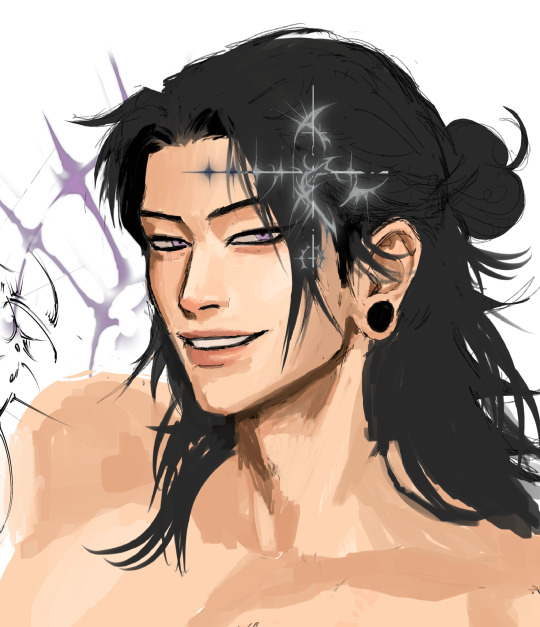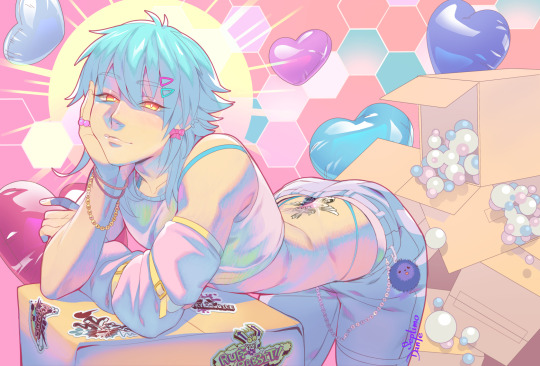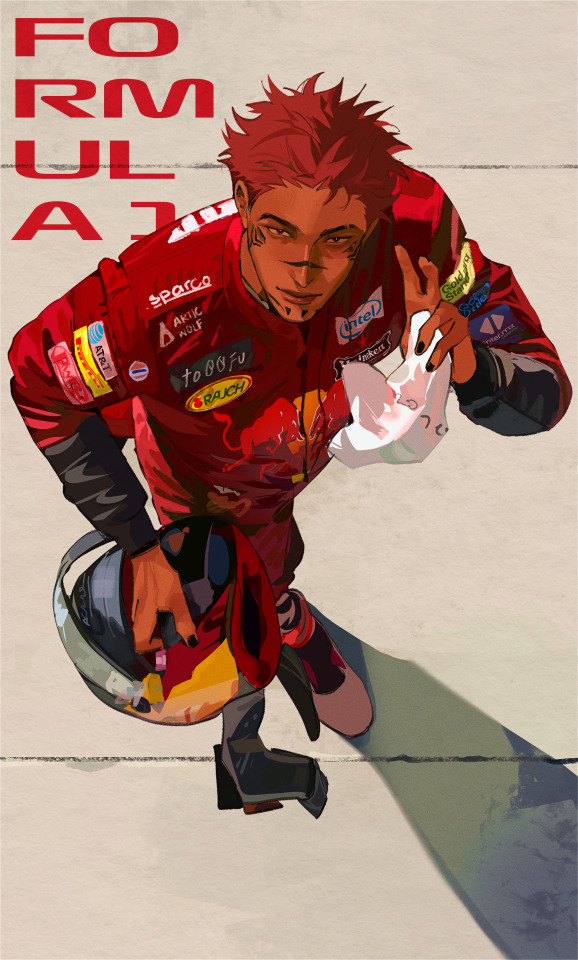Text

Shoujo and Gender: Rebellion in Indifference
Like many others in my age demographic, Ouran High School Host Club (OHSHC) was one of the first shoujo I ever watched. It’s incredibly well-renowned and for good reason - the entire show essentially acts as a subversion of typical shoujo troupes regarding both romance and, more interestingly, gender, which is the reason I decided to rewatch it. The exploration of gender in the series is refreshing for an early 2000s piece of media, and Haruhi is not the “typical” shoujo protagonist. Unmotivated by romance or the pursuit of femininity, she is strong in her identity and her distaste for those she perceives as snobby or cruel. Despite the other members of the casts’ attempts to “feminize” Haruhi, Tamaki in particular believing there is some buried desire within Haruhi to be a more traditional woman, she remains uninterested. Although her self presentation is not always more masculine leaning, she does not seem to change her attitude regarding gender itself and her lack of care surrounding it no matter what clothing or hairstyle she adopts. It is this in particular, I think, that makes her one of the earliest examples of gender nonconformity and an almost nonbinary identity.
To elaborate a bit on the plot for those unfamiliar, Ouran High School Host Club follows protagonist Haruhi Fujioka, a young woman starting her first year at affluent private school Ouran High. Attending on a scholarship, Haruhi understandably feels out of place among her much wealthier peers, her crooked glasses and baggy beige sweater a sharp contrast to the elegant, flouncy dresses and smart blue suits worn by the other students. Feeling overwhelmed, Haruhi enters a music room in search of a quiet place to study - and is immediately cornered by the host club, a group of 6 handsome young men who all act as trope-specific wish fulfillment (Tamaki is princely, Mori is strong and silent, Hikaru and Kaoru… well) for the female students. A flustered and uninterested Haruhi attempts to make a swift exit, accidentally knocking over an absurdly expensive vase in the process and subsequently being made into the host club’s “errand boy” in order to pay off her debt.
What is most interesting about this opening episode, in my opinion, is the way Haruhi’s gender non-conformity is both emphasized and almost framed as costume-like by the host club members, despite Haruhi’s feelings regarding her gender. There are literal “lightbulb” moments in the first episode as all the host club members discover she’s female, all of which are seemingly innocuous - Honey, for instance, realizes Haruhi is a girl when she calls his stuffed bunny cute. However, it is only when Haruhi is made to change into the male uniform that all the members discover her “true identity.” Tamaki tries to insist that Haruhi dress more femininely, but she refuses, stating that femininity is unimportant to her. Even when Haruhi does dres in a feminine manner, she still does not fit the traditional role of a woman in society, or a shoujo lead.

Despite the club members seeming to believe that her biology has hard-wired her in some way to be secretly drawn to femininity (after all, their attitudes towards her change when they discover she is female), Haruhi continually reasserts that she is indifferent. I think that this showcasing of a non-traditional protagonist really spoke (and continues to speak) to both queer people and to the “weird girl” archetype associated with consumption of anime.
6 notes
·
View notes
Text

plea and ending.
kawoshin
insta ; @windsaor
7K notes
·
View notes
Text
Cherry Magic and Cynical Portrayals: BL's Assumed Audience

For my BL, I wanted to venture outside of my typical “comfort zone” (men beating each other up) and try something a little more slice-of-life-esque, settling on this one because I thought the premise was quite funny and it was sufficiently different to other BL media I’ve consumed in the past. The plot centers on protagonist Adachi, who wakes up on his 30th birthday to the realization that he is now able to hear people’s thoughts - but only when he touches them. His slow realization of this new power he’s been granted comes to a head when he comes into contact with his handsome co-worker, Kurosawa. He hears Kurosawa’s internal musings about his “cute bedhead”, realizing with both horror and intrigue that his colleague is in love with him. The series continues to follow the budding romance between the two, culminating in Adachi being comfortable around Kurosawa without needing to use his power, losing said power after the two have sex, and eventually marrying him.
My initial reaction to this series was that I enjoyed it a lot more than I anticipated! Despite the silly premise, I found that the story had a relatively grounded way of handling relationship conflicts and the struggles that may arise when one is inexperienced at an age society deems “too old” to have never been in a relationship. I did, however, find myself reflecting quite a lot on our class discussions regarding BL acting as an advocate for LGBT rights (or vice versa), particularly after the marriage scene in the final episode. The scene itself is quite brief - it’s a still image of the two dressed in white suits standing on what appear to be church steps. There is no dialogue, no “I do’s”, but the implication seems pretty clear. I think this scene was interesting to me mostly because it seems like it must be hinting at something political; after all, same-sex marriage is not legal in Japan. If these two were a real life gay couple, they would not be able to achieve this idyllic, traditional path relationships are expected to eventually go down. In this seeming incongruence, you may expect the series to at least hint at themes of repression and the desire to be a couple despite societal pressures.
However, this is not necessarily the case. As with many BL series, the two never once refer to themselves as gay, or seem to indicate having any connection with gay subculture in Japan. There is no broader discussion or insight from Adachi in regards to the role his sexuality plays in being a virgin at 30. At certain points, the role of Adachi almost seems to be a cynical one that reflects back onto the viewer. Just as Twilight was written to appeal to girls who may feel disenfranchised and undesirable, the author penning a narrative about a “plain” high school girl who is swept away by a desirable boy only she could understand, Cherry Magic seems to speak to BL’s assumed audience - sexually inexperienced and “undesirable�� women. In this context, the marriage scene makes more sense. It may not necessarily serve as political commentary or an unspoken desire for social change as much as it serves as wish fulfillment for fans of BL, even taking on the role of assuaging guilt and reassuring watchers that despite their "abnormal" interest in BL, there is still "hope" for them (in that they will still be able to fulfill a "woman's role" as a wife).
There's certainly much more I could say, but I would like to add that I don't think a BL has to comment on social stigma or make sweeping political gestures to be "good." The relationship between Adachi and Kurosawa is cute, and I do think most of the subject matter in the anime was handled quite well; I think this can be acknowledged whilst also examining writer decisions and questioning real world assumptions.
2 notes
·
View notes
Text


I can’t keep up with all the socials help, heres some geto doodles hehe ! I will try to keep up with all the platforms I use 😈
17K notes
·
View notes
Text

HAPPY BIRTHDAY TOWA!! New Uiro Yamada art <3
380 notes
·
View notes
Text
Kurt/Spock, Killing Stalking, and Kinky Subjugation: The "I Can Fix Him" Industrial Complex

Q: Do you agree with Russ' theory that K/S sexualizes the feminine condition? What does that mean to you, and how do you see this sexualization working? Is this resistance?
Killing Stalking, a popular manhwa, written by author Koogi, began publication in March of 2016 to tremendous uproar. The series took the internet by storm, seemingly inescapable for anyone who engaged at any level in fandom spaces. A horror manhwa to some and a BL to others, the story follows titular characters Yoonbum and Sangwoo, two young men residing in Korea. Yoonbum, a mentally ill college student, has been harboring an intense crush on Sangwoo for years, following Sangwoo intervening in an assault attempt during their mandatory military service. It is here that we can first identify an instance of “sexualizing the female condition” - Sangwoo, by saving Yoonbum in this one instance, has (in Yoonbum’s mind), essentially saved him from all of his past abuse, condemning and decrying what he suffered under the hands of his uncle and the other abusive male figures in his life. Yoonbum doesn't know anything else about Sangwoo; they are not friends, nor do they speak with each other after this instance - but this one instance of kindness is enough to create an intense, all consuming obsession on Yoonbum’s end.
Following their military service, Yoonbum stalks Sangwoo, following him and keeping a constant tab on his whereabouts. This includes tracking down the location of Sangwoo’s apartment, where Yoonbum tries endlessly to crack the door code that would allow him to enter. On the day Yoonbum is finally able to gain access, he is beside himself with excitement - he is finally granted a window into Sangwoo’s personal life. Running his hands along the kitchen countertops, rubbing his face on Sangwoo’s bedsheets, and imagining Sangwoo watching TV on his couch, Yoonbum imagines an idealized version of Sangwoo in this moment - one who is an extension of the brief interaction they had wherein Sangwoo acted as his savior. This illusion is so strong that when Yoonbum finds a woman imprisoned in Sangwoo’s basement, screaming for help, he is almost completely unable to process that it is Sangwoo who is keeping her trapped - it is “not the Sangwoo he knows.”
Sangwoo is objectively not the kind and considerate figure Yoonbum once believed him to be - he is a rapist and a murderer, devoid of empathy or moral compass. And yet, when Sangwoo confronts Yoonbum, hitting him with a baseball bat and initially intending to kill him, Yoonbum offers him a love confession. Speaking nothing of the woman writing in agony on the floor, Yoonbum tells Sangwoo that he never intended to be bothersome in this way, he just couldn't resist - he “fell in love.” When Sangwoo tells Yoonbum the basement isn’t big enough for Yoonbum and the woman, Yoonbum is so delighted by the possibility of being granted forgiveness and acknowledgement by Sangwoo that the implications of what will happen to Sangwoo’s captive do not even seem to phase him. As their “relationship” progresses and develops, Yoonbum holds on to this idea of Sangwoo as a savior figure, desperate to “work through” the violence and get to the idyllic relationship he is imagining. Even when Yoonbum is liberated, safe from his abuser and captor, all he can think about is how much he misses Sangwoo and wants to be back in his life. Yoonbum is, essentially, patient zero in the “I can fix him” camp of characters that are so prominent in BL.
Within BL spaces, and female-dominated fandom spaces in general, the idea of “fixing” troubled and/or abusive male characters is one that is quite popular. Given that our society is a patriarchal one, this is to be expected to some degree - as Russ writes, women are rightfully wary of heterosexual entanglements, anxieties regarding potential violence they may be vulnerable to in situations with men being incredibly common. If violence is to be expected, well.. maybe there is something to the idea of abuse being a precursor to achieving emotional vulnerability and equality within a relationship. There is something to be said about this idyllic fantasy in which one might be able to change or fix a man raised in patriarchy; break down his walls, understand him fully, and in return have him view you as an equal and autonomous partner in the relationship - you are the one who will have saved him, elevating him from a mere cog in the patriarchal wheel to a sensitive and kind man in touch with his emotions.
The core of this fantasy is, again, violence - the act of “fixing” necessitates violent behavior or actions that need to be remedied. Just as Yoonbum holds on to his first impression of Sangwoo as a protector and a savior figure despite Sangwoo’s abuse and torture, many women hold on to the idea that violent male partners are inherently good people, they just have trouble expressing their emotions properly. In the Kurt/Spock work that Russ cites, much of it acts a “metaphor for intensity” - intense monogamy, emotional agony, and violence that leads to nurturing and apology all being precursors for love, love that will (in theory) invoke some kind of equality between the parties in the relationship.
So, is this resistance? Well, no, but that isn’t me placing moral judgement on women who enjoy consuming this media and projecting the “I can fix him” fantasy onto the most irredeemable of characters. The eroticization of female subjugation can certainly give one the impression of resistance. To sexualize your chains is something that, I’m sure, feels liberatory on a personal level - if patriarchy is completely inescapable, why not work to find a semblance of sexual freedom within those bounds, even if they are heavily informed by male subjugation? In Right Wing Women, Dworkin remarks that the prison of patriarchy can also be a house. What this passage tells us in this context is that, despite having to suffer through violence in order to achieve this idyllic fantasy of yourself being equal to male figures in your life, there is something that feels freeing about the fact that you are the one allowing yourself to explore this violence and the ultimate “end goal” of patriarchy on your own terms through fiction. You may always be Yoonbum, working in the kitchen despite your ankles being broken, but at least now you know that this is one step closer to becoming valuable in the eyes of your captor.
6 notes
·
View notes
Text

I cooked so hard with hikaru's hair
4K notes
·
View notes
Text

Posting yaoi jesus babygirl here too
3K notes
·
View notes
Text

The brighter his light is, the darker the shadows behind his back will be
1K notes
·
View notes
Text


quick drawing of lady oscar! two versions bc i couldn't decide which one i like more
26 notes
·
View notes








